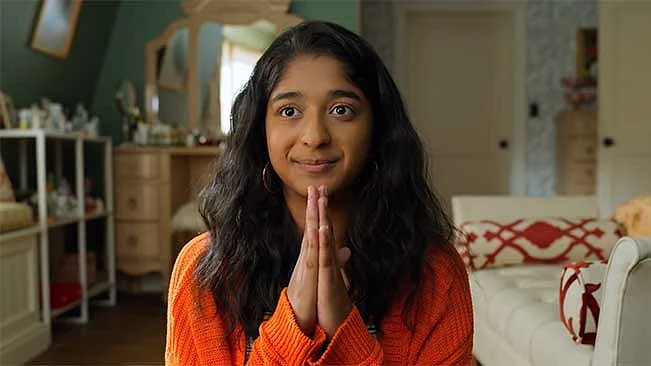When Mindy Kaling announced Never Have I Ever last year, we cheered for her and for all the right reasons. Out on Netflix, the ten-part show is an easy-breezy watch for anyone who likes a good teenage drama. It’s funny, it’s sensitive, it’s refreshing and it can get you in the guts if you happen to watch that last episode on one of those weak days.
Whether it’s Devi, Elenor or Fabiola, the show isn’t just trying to explore the lives of teenagers who want to start dating or try out alcohol and drugs. Never Have I Ever goes beyond all of that by trying to encapsulate the journey of these ‘growing up’ years by understanding why we make good friends through our school and college years.
But as someone sitting here in India and watching Never Have I Ever, I was left with minor nagging concerns, a few questions and some *sighs* I tried to hold under my breath.
Fake Indian Accent - Why Am I Not Surprised?
I am sorry that I am raising this debate for the thousandth time but when will foreigners stop overdoing the Indian accent? I want to thank the makers of The Big Bang Theory over and over again for casting Kunal Nayyar, an actor who came comes from New Delhi and found a place in one of the biggest sitcoms in American TV, as Raj Koothrapali in the show. His accent was spot on.
Now Sendhil Ramamurthy, who plays Devi’s dad in Never Have I Ever (and how can I say this in a way that hurts the least), is not convincing as an Indian-born living in the US and the only reason for that is his accent. It just sounds made up, reducing my attention span to that of a goldfish in seconds.
According to Mindy Kaling, she was careful while casting for the show. Understandably, the show, which is semi-autobiographical in nature, had to cast someone who would resemble Kaling herself in some way at least. Well, we wish closer attention was given while casting Devi’s dad too.
I don’t know if I am the only one but, why are Indian moms shown to be some kind of a villain? In one episode, Devi is seen thinking about the things she really wants should happen to her and one of them is her mother saying, “I’m proud of you.” Sure some people have a difficult relationship with moms and in Devi’s case, her mother is a single parent raising her. But Nalini is made out to be too much of a strickler and that sure is overdone.
Indians = Arranged Marriages, It Seems
To begin with, when the show introduced the whole arranged marriage plot I wasn’t surprised. You’re making a show about a first-generation Indian American and you won’t talk about an arranged marriage? How can that be it, right? As the show progressed, the viewer in me was relieved at how Kamala was handling her personal life and the sudden epiphany she has after watching Beth in Riverdale on TV. She’s a PhD student who still looks for inspiration from fictional characters. I will suspend some disbelief.
And then came this scene...
“I am the Hester Prynne of the Indian community...” Jaya, a character who pops in Kamala’s life at Ganesh Puja tells her because she divorced her husband. “I wish I had just listened to my family and married the guy they chose. Then maybe I wouldn’t be divorced,” she says and then comes the unsolicited advice about Kamala’s arranged marriage situation - “Don’t screw it up.”
The whole Jaya arc in the show heavily reinforces the idea around stereotypical Indian thinking that if you don’t marry the man your parents choose, you’ll get divorced. And if you marry a ‘Muslim’, your family WILL abandon you. Sounds familiar? I am sure you can hear an ‘aunty’ in your head talking.
Diversity, Who Dat?
Apart from this, one tends to wonder why Kamala is shown to be this perfect, obedient girl from India who’s a ‘yes man’ to Devi’s mother all the time.
There’s one whole episode dedicated to showing the Indian diaspora and they can be seen celebrating the Indian festival of ‘Ganesh Puja’ where we see a clip of ‘Durga Puja’ thrown in the montage apart from the usual suspects like the Taj Mahal and an elephant.
Somehow all the Indians in Devi’s world are from the South of India, which goes to show that the show projects very little or no intersectionality. Punjabis and Gujaratis are a huge part of the Indian diaspora settled in the US. Also, not all Indians are Hindus and that comes across in a simple line from Devi. As an Indian sitting here and watching Never Have I Ever, I wished the show could talk about India’s diversity a little more.
And in the name of representation, we have the grossly cliched silk saree dresses, the bindi designs that were marked dated in the 90s and a mother who keeps sneaking up on her daughter - thanks to the trust issues.
There are times in the show when you begin to realise that Eleanor and Fabiola (Devi’s friends) have more interesting things happening their lives and Devi’s concerns seem almost frivolous. For example, Fabiola realising she’s gay and coming out to her closed ones and Eleanor trying to reconcile with her mother.
For all those saying that these women in the show ‘stand for themselves’, this girl wants to have sex etc. is how the show is smashing stereotypes - I am sorry, clearly, we are trivialising issues here. And for those who don’t care about anything but entertainment, this show is a light watch.
(At The Quint, we question everything. Play an active role in shaping our journalism by becoming a member today.)
